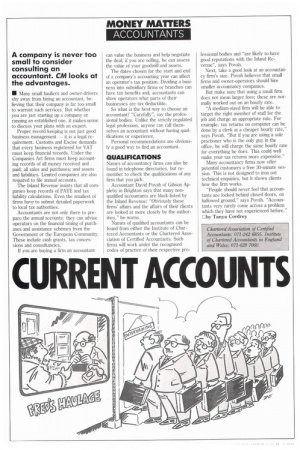MONEY MATTERS ACCOUNTANTS
Page 34

If you've noticed an error in this article please click here to report it so we can fix it.
IN Many small hauliers and owner-drivers shy away from hiring an accountant, believing that their company is far too small to warrant such services. But whether you are just starting up a company or running an established one, it makes sense to discuss your plans with an expert.
Proper record keeping is not just good business management — it is a legal requirement. Customs and Excise demands that every business registered for VAT must keep financial records. Under the Companies Act firms must keep accounting records of all money received and paid; all sales and purchases; and assets and liabilities. Limited companies are also required to file annual accounts.
The Inland Revenue insists that all companies keep records of PAYE and tax liability calculations. Even the smallest of firms have to submit detailed paperwork to local tax authorities.
Accountants are not only there to prepare the annual accounts: they can advise operators on the financial timing of purchases and assistance schemes from the Government or the European Community. These include cash grants, tax concessions and consultancies.
If you are buying a firm an accountant can value the business and help negotiate the deal; if you are selling, he can assess the value of your goodwill and assets.
The dates chosen for the start and end of a company's accounting year can affect an operator's tax position. Dividing a business into subsidiary firms or branches can have tax benefits and, accountants can show operators what parts of their businesses are tax deductible.
So what is the best way to choose an accountant? "Carefully", say the professional bodies. Unlike the strictly regulated legal profession, anyone can call themselves an accountant without having qualifications or experience.
Personal recommendations are obviously a good way to find an accountant.
QUALIFICATIONS
Names of accountancy firms can also be found in telephone directories, but remember to check the qualifications of any firm that you pick.
Accountant David Povah of Gibson Appleby in Brighton says that many nonqualified accountants are black-listed by the Inland Revenue: "Obviously these firms' affairs and the affairs of their clients are looked at more closely by the authorities," he warns.
Names of qualified accountants can be found from either the Institute of Chartered Accountants or the Chartered Association of Certified Accountants. Such firms will work under the recognised codes of practice of their respective pro
fessional bodies and "are likely to have good reputations with the Inland Revenue", says Povah.
Next, take a good look at an accountancy firm's size. Povah believes that small firms and owner-operators should hire smaller accountancy companies.
But make sure that using a small firm does not mean larger fees; these are normally worked out on an hourly rate.
"A medium-sized firm will be able to target the right member of staff for the job and charge an appropriate rate. For example, tax returns on computer can be done by a clerk at a cheaper hourly rate," says Povah. "But if you are using a sole practioner who is the only guy in the office, he will charge the same hourly rate for everything he does. This could well make your tax returns more expensive."
Many accountancy firms now offer potential customers a free 30-minute session. This is not designed to iron out technical enquiries, but it shows clients how the firm works.
"People should never feel that accountants are locked behind closed doors, on hallowed ground," says Povah. "Accountants very rarely come across a problem which they have not experienced before." Oby Tanya Cordrey




















































































